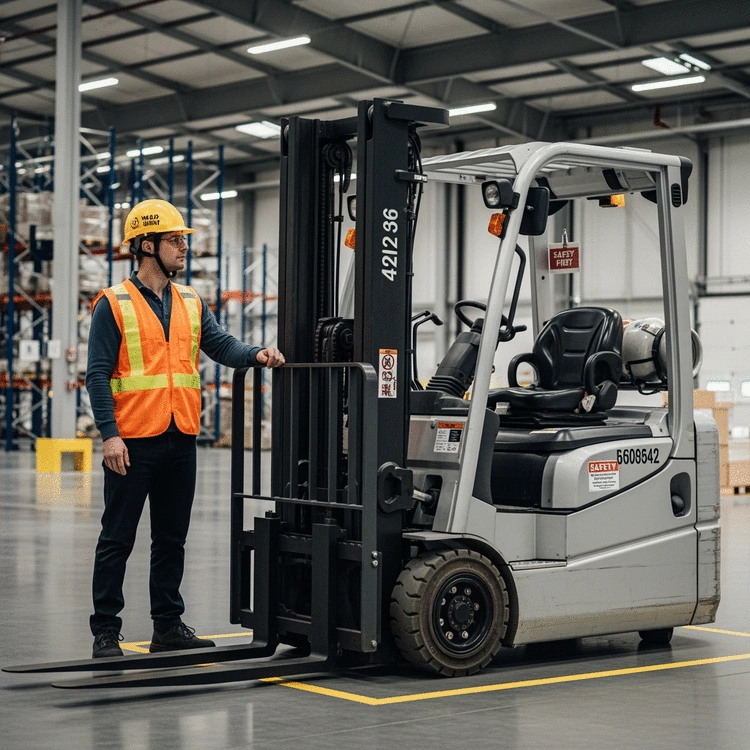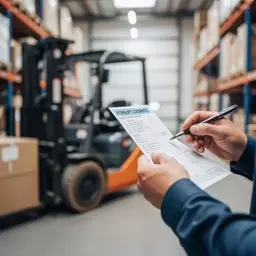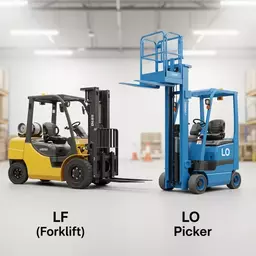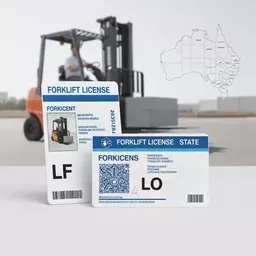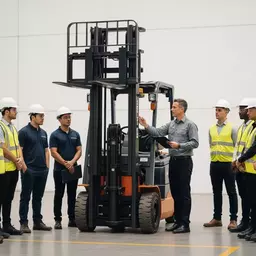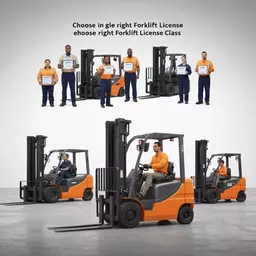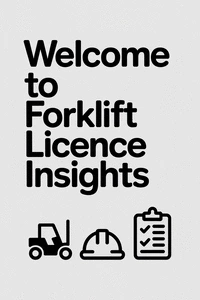Have you ever considered how your safety practices could impact not only your career but also the well-being of your coworkers? Forklift operation is a critical task that requires adherence to stringent safety protocols. Understanding the importance of these practices is the first step toward becoming a responsible operator.
What You Will Learn
- The role of qualified operators in enhancing workplace safety and reducing accidents.
- Key safety tips to remember while preparing for your forklift license test.
- Essential daily inspections needed to keep forklifts safe and compliant.
- The importance of maintaining equipment and safety devices for optimal operation.
- Best practices for understanding and following forklift inspection procedures.
- Actionable steps to prepare effectively for your forklift license test.
Forklift Safety Essentials: A Visual Guide
This visual guide highlights the key areas of forklift safety, from operator training to daily inspections, ensuring a safe and compliant working environment. For more detailed information on certification, consider exploring a certified forklift training program in Australia.
Operator Readiness: Training & Certification
- ✓ Improved Safety Standards
- ✓ Reduced Accidents
- ✓ Enhanced Compliance
Pre-Operation Inspections: Key Checklist
- ► Tires: Inflated & Good Condition
- ► Brakes: Proper Functionality
- ► Fluids: No Leaks (Oil, Hydraulic, Coolant)
- ► Forks: No Wear and Tear
Maintaining Equipment & Safety Devices
- • Check Devices Before Each Shift
- • Schedule Regular Service
- • Document All Repairs & Maintenance
Compliance & Inspection Procedures
- ✓ Follow Inspection Checklist
- ✓ Document Findings & Actions
- ✓ Regular Audits for Adherence
Understanding Forklift Safety: Essential Practices Before Your License Test
As you embark on your journey to obtain a forklift licence, understanding forklift safety is essential. The significance of training and certification cannot be overstated; they are crucial for ensuring that only qualified operators handle these powerful machines. This not only boosts safety standards on the job site but also helps prevent accidents that can lead to serious injuries or even fatalities.
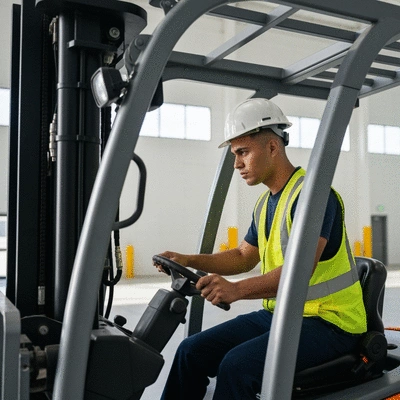
In my experience at Forklift Licence Insights, I’ve seen firsthand how proper training transforms a novice into a skilled operator. When operators are well-trained, companies benefit from reduced risk and increased productivity. It's a win-win situation!
The Importance of Qualified Operators in Forklift Safety
Qualified operators play a vital role in maintaining a safe work environment. Training equips them with the right knowledge and skills to operate forklifts efficiently and safely. Here are some reasons why this is crucial:
- Improved Safety Standards: Certified operators understand safety protocols and procedures.
- Reduced Accidents: Proper training helps prevent workplace accidents and injuries.
- Enhanced Compliance: Operators familiar with regulations ensure that the workplace adheres to safety laws.
By investing in training, you’re not just gaining a licence; you’re committing to a culture of safety and responsibility. It’s an essential step toward becoming a proficient forklift operator! If you're looking to get started, learn more about getting your forklift licence in Australia.
Preparing for the Forklift License Test: Key Safety Tips
Preparing for your forklift license test involves more than just studying a manual. It’s about embracing a mindset of safety and diligence. Here are some key safety tips you should know:
- Always wear appropriate personal protective equipment (PPE).
- Stay informed about the specific safety regulations relevant to your work environment.
- Practice good communication with coworkers, especially in busy areas.
- Be aware of your surroundings, including pedestrians and other equipment.
These practices not only help you pass your test but also prepare you for real-world operations. Remember, safety starts with you—making it a priority will lead to a successful career in forklift operation!
Daily Inspections: Keeping Forklifts Safe and Compliant
Conducting Pre-operation Inspections
Before you even start your shift, conducting daily pre-operation inspections is essential for ensuring forklift safety. This involves checking the condition of the forklift to prevent any mechanical failures during operation. Here’s a quick checklist of what to inspect:
- Tires: Ensure they are inflated and in good condition.
- Brakes: Check for proper functionality.
- Fluids: Look for leaks in oil, hydraulic, and coolant systems.
- Forks: Inspect for any signs of wear and tear.
These simple checks can make a huge difference in safety and compliance! If you identify any issues, don’t hesitate to report them to your supervisor or maintenance team.
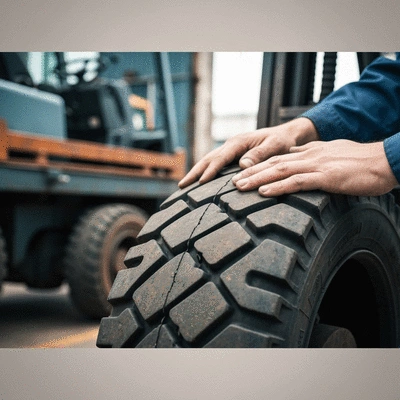
Maintaining Forklift Equipment and Safety Devices
Regular maintenance is a non-negotiable part of forklift operation. Forklifts come equipped with various safety devices—like seat belts, horns, and alarms—that are critical for safe operation. Here are some key maintenance practices:
- Check safety devices before each shift to ensure they are functioning properly.
- Schedule regular service and maintenance checks to prevent breakdowns.
- Document any repairs and maintenance work performed for compliance tracking.
Staying on top of these practices not only keeps operators safe but also extends the lifespan of the equipment!
Understanding Forklift Inspection Procedures
Adhering to forklift inspection procedures is vital for compliance with safety regulations. Understanding what these procedures entail can help maintain high safety standards in your workplace. Here’s what to focus on:
- Follow the established inspection checklist to ensure all components are reviewed.
- Document findings and actions taken during inspections.
- Conduct regular audits of inspection processes to ensure adherence to safety regulations.
By recognizing and following these essential procedures, you set yourself up for success and compliance. It’s all about fostering a safe working environment!
Pro Tip
Did you know? Regularly reviewing your forklift safety protocols not only enhances your compliance but also boosts your confidence as an operator. Consider setting aside time each week to revisit your training materials and stay updated with any changes in safety regulations.
Recap of Essential Safety Practices for Forklift Operators
As we wrap up our discussion on forklift safety, it’s crucial to remember the key practices that every operator should prioritize. These essential safety practices not only prepare you for your forklift license test but also ensure a safe working environment every day. Below are some highlights to keep in mind:
- Completion of thorough training and certification.
- Daily inspections of forklifts before operation.
- Understanding load stability and weight limits.
- Awareness of surroundings while operating.
- Compliance with OSHA regulations and best practices.
These practices set the foundation for safe forklift operation and are vital for minimizing accidents and enhancing workplace safety. Your commitment to these principles will serve you well in your forklift journey!
Taking Action: Preparing for Your Forklift License Test
Now that we've covered the essential practices, it’s time to take action! I encourage you to review your knowledge of forklift safety practices regularly. Don’t hesitate to consider additional training resources or checklists to ensure you’re fully prepared for your test. Here are some steps you can take:
- Review training materials and safety guidelines.
- Participate in practice tests or quizzes.
- Connect with experienced operators for shared insights.
- Utilize checklists to ensure compliance with safety protocols.
Preparing effectively for your forklift license test can make all the difference in your confidence and competence as an operator. Remember, knowledge is key!
FAQs About Forklift Safety and Licensing
Why is understanding forklift safety crucial for operators?
Understanding forklift safety is crucial for operators because it not only protects their career but also ensures the well-being of their coworkers. Adherence to stringent safety protocols helps prevent accidents, injuries, and fatalities, while also boosting workplace safety standards and productivity.
What role do qualified operators play in workplace safety?
Qualified operators are vital for maintaining a safe work environment. Their training equips them with the knowledge and skills for efficient and safe forklift operation, leading to improved safety standards, reduced accidents, and enhanced compliance with safety regulations.
What are the key safety tips for preparing for a forklift license test?
Key safety tips for preparing for a forklift license test include always wearing appropriate personal protective equipment (PPE), staying informed about relevant safety regulations, practicing good communication with coworkers, and being aware of your surroundings, including pedestrians and other equipment.
What does a daily pre-operation inspection involve?
A daily pre-operation inspection involves checking the forklift's condition to prevent mechanical failures. This includes inspecting tires for inflation and condition, checking brakes for functionality, looking for fluid leaks (oil, hydraulic, coolant), and examining forks for wear and tear.
How can operators ensure compliance with forklift inspection procedures?
Operators can ensure compliance by following the established inspection checklist, thoroughly documenting all findings and actions taken during inspections, and participating in regular audits of inspection processes to ensure adherence to safety regulations.
Engagement and Resources for Aspiring Forklift Operators
At Forklift Licence Insights, we believe in empowering our readers with comprehensive resources to aid in your preparation. Here are some valuable links to downloadable guides, checklists, and multimedia resources designed to help you succeed in your forklift testing journey:
- Forklift Safety Checklist
- Training Video Series on Safe Operations
- Live Webinar on Forklift Safety Practices
- In-depth Articles on Compliance and Safety
Taking advantage of these resources can enhance your understanding and readiness, ensuring you approach your licensing test with confidence.
Safety Training Programs and Workshops Available
In addition to our resources, consider enrolling in safety training programs and workshops that focus on practical skills and knowledge. Here are some options to explore:
- Local Registered Training Organisations (RTOs) offering hands-on training.
- Online courses that provide flexible learning opportunities.
- Workshops focusing on specific areas, such as load handling and safety devices.
Participating in these programs can not only improve your skills but also connect you with others in the industry who share your passion for forklift operation!
Final Thoughts on Forklift Safety and Operator Readiness
As we conclude this section, I want to emphasize the critical nature of forklift safety. Your responsibility as an operator is immense; adhering to best practices not only protects yourself but also your colleagues and the entire workplace. Always remember that being well-prepared is the first step toward ensuring safety and compliance in your operations. For further reading, explore essential forklift safety rules for operators. Let's strive for excellence together!
Recap of Key Points
Here is a quick recap of the important points discussed in the article:
- Completion of thorough training and certification is crucial for safe forklift operation.
- Conduct daily pre-operation inspections to ensure equipment safety and compliance.
- Understand load stability and weight limits to prevent accidents.
- Maintain awareness of surroundings while operating a forklift to ensure safety.
- Adhere to OSHA regulations and best practices for a compliant and safe work environment.
